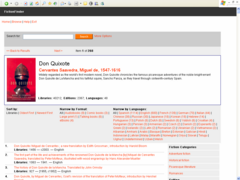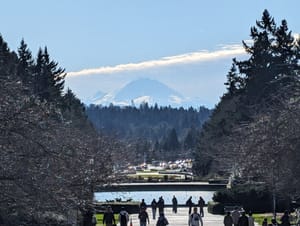 We seem to have turned a corner with library search. For example, one of the strategic priorities for the British Library is to ‘transform search and navigation‘ in support of access to their collections, although there is little detail about what will be attempted. There has been significant recent discussion about catalog search and the deficiencies of current approaches, with some recent emphasis on the UC study and on the NCSU catalog. There has also been a growing interest in placing search at the point of need, reaching into user environments in various ways (for example by placing subject-specific metasearch bundles in course pages), or by opening up search APIs. And, we are beginning to discuss how to mobilize the edge with collaborative bookmarking, tagging and so on. The orginal Long Tail discussion noted that ‘navigation’ would be increasingly important in large databases, and I touched on this when talking about the long tail and libraries.
We seem to have turned a corner with library search. For example, one of the strategic priorities for the British Library is to ‘transform search and navigation‘ in support of access to their collections, although there is little detail about what will be attempted. There has been significant recent discussion about catalog search and the deficiencies of current approaches, with some recent emphasis on the UC study and on the NCSU catalog. There has also been a growing interest in placing search at the point of need, reaching into user environments in various ways (for example by placing subject-specific metasearch bundles in course pages), or by opening up search APIs. And, we are beginning to discuss how to mobilize the edge with collaborative bookmarking, tagging and so on. The orginal Long Tail discussion noted that ‘navigation’ would be increasingly important in large databases, and I touched on this when talking about the long tail and libraries.
Here are some directions in library search (is this the right word?) we are likely to see over the next while. And remember this is about ‘and’ not ‘or’. New value will emerge from the combination of a variety of approaches to create more engaging, functional, or effective services. What is also clear is that our historic notion of ‘search’ as discovery will shift to something more like a search, share and subscribe model. New ways of searching; new ways of sharing and recommending; new ways of syndicating data and service.
Ranking and recommending based on intentional data
The innovation of Google – ranking based on linking – has had a major impact on our thinking. We have a range of intentional data which can help ranking. By intentional I mean data which reflects choices and behaviors: it captures intentions. Examples are holdings data (collection development choices), circulation data, download counts, database usage counts, resolution counts. Our experience with holdings suggests that such ranking can be very effective in large retrieval sets.
We can also do more recommendation based on intentional data (people who borrowed x also borrowed y; people who downloaded x also downloaded y; these items appeared on the same reading list as that item; and so on). See Dave Pattern’s work with circulation as an example. And we can build on this. For example we are experimenting with holdings data to see what we can say about likely audience: the pattern of holdings says something about the audience that might find something interesting. We can infer something about audience where something is largely held by school libraries, or by ARLs, …
Making bibliographic structure work harder
Libraries are realizing that we should work harder to release the value of the historic investment in bibliographic data. Examples are the interest in FRBR, faceted browsing, place-based access. The data in our catalogs can support rich and engaging experiences, as the NCSU catalog, RedLightGreen, and FictionFinder (a new version of which will soon be released) show.
Mobilizing the edge
Books and cultural memory materials encourage conversations. Sharing and recommending are natural learning and research behaviors. We need to mobilize such conversational and sharing behaviors to enrich the experience of those who use our services. Reviews, tagging, recommendations. There has been some early discussion about formal resource description and taxonomies vs tagging and other approaches. I don’t see these as oppositional, as services can be built which exploit both the current structured and the textured conversational space. For example, tagging has a potentially valuable role in bringing together materials for a course, or a particular argument, or … (See the nice example cited by Stu). By the same token, one wants to make library resources easily citable and sharable in other environments – social bookmarking services for example. We are in early days here.
Syndicating data and services to where the users are
We are used to the idea of searching a database or visiting a website. I think that we are seeing a move from database to website to workflow as the main focus of activity. Services need to be delivered into emergent personal digital environments (e.g. RSS aggregator) or prefabricated workflow managers (e.g. course management systems). This means that we are seeing growing interest in remixing data and services in environments outside the library website. Data flows into reading lists, citation managers, social bookmarking sites, search engines, RSS aggregators, …. Services will exposed through linkable URLs, APIs, simple web services, which facilitate recomposition by user environments (see the experiments by John Blyberg and Dave Pattern for example).
I find it interesting the way we talk about ‘technology’. Often we imagine it as something additive, or something that changes one of the pieces in an existing frame, however much of the import of the current web 2.0 discussion is that the way we organize ourselves to achieve certain goals will change in the network environment also. This comes through in some of the examples I mention above.
Related entries:
Share
More from LorcanDempsey.net



